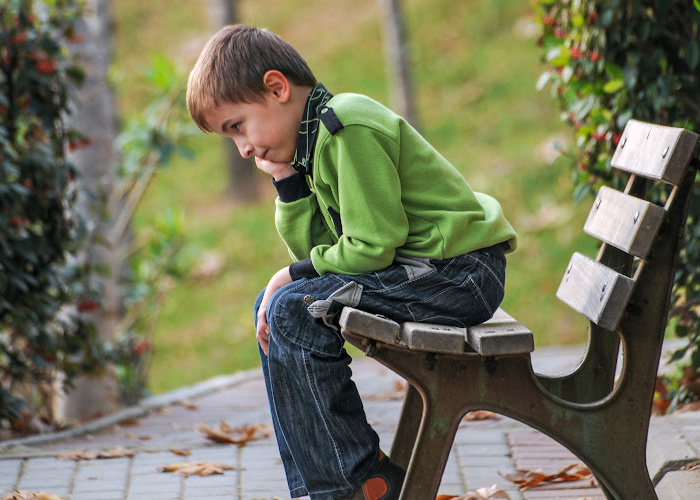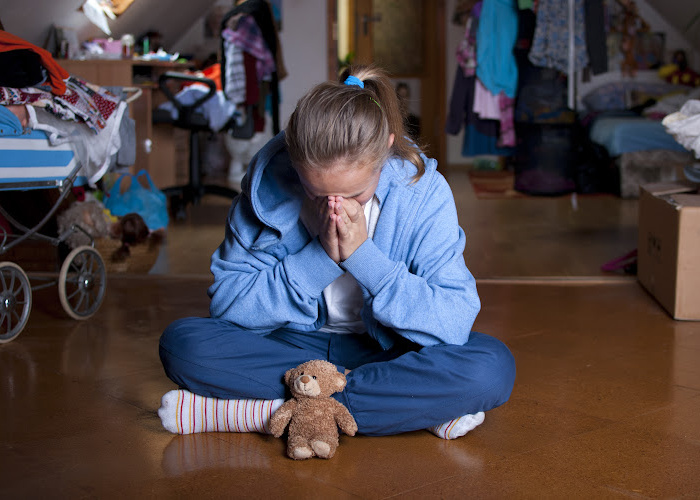It's crucial to know that students with autism and ADHD need special study strategies. Autism…

Guide to Supporting Autistic Children Through Grief and Loss
When the waves of loss touch our lives, the shores of our family dynamics can be altered, particularly when supporting autistic children dealing with loss. It’s during these times that compassion becomes our compass, guiding us to the resources and strategies for helping autistic children cope with grief.
The journey through bereavement is unique for each person, and autistic children are no exception; they require our understanding, patience, and tailored support. This guide serves as a beacon to caregivers and families, offering tips for supporting autistic children through bereavement with empathy and expertise.
Understanding Grief in Autistic Children
When autistic children experience grief, their responses can be quite distinct from their non-autistic peers. Understanding the needs of autistic children during grief is paramount for parents and caregivers seeking to offer comfort and understanding.
Recognizing and addressing the differences in how grief manifests in these children is the first step in providing proper support.
Grief Manifestations Unique to Autism
Autistic children might respond to loss with a range of emotions and behaviors that can include anger, restlessness, or even excitement. These responses are intricately linked to their difficulty in processing and expressing emotions. Some may not exhibit visible signs of grief or may have a delayed response to their loss, which adds complexity to understanding their needs.
Moreover, routine disruptions can exacerbate challenges in both executive functioning and emotional regulation. Caregivers should be attuned to these aspects to offer meaningful grief support for autistic children.
Support Strategies That Acknowledge Autism’s Influences
To effectively help an autistic child with bereavement, strategies should consider autism’s profound impact on the child’s grieving process. Autism and bereavement resources suggest the importance of maintaining structured routines, employing clear communication, and preparing for potential social stressors.
Advanced preparation for events, such as funerals, can be particularly beneficial in helping autistic children navigate the grieving process. By accommodating sensory sensitivities and providing a patient, supportive environment, caregivers can significantly aid in coping with bereavement for autistic kids.
Expert Insights Into Autistic Grieving Patterns
Experts in autism and bereavement have highlighted that autistic children may show an intensification of autistic traits during periods of loss. Understanding grief in autistic children involves seeing beyond typical expectations of mourning and acknowledging the unique ways in which these children may process their emotions.
Autism specialists emphasize the value of concrete explanations and expressive activities, which can serve as vital autism and bereavement resources for families. These insights are crucial in helping autistic children navigate their grief journey.

How to Help an Autistic Child with Bereavement
Supporting a child with autism through the grieving process necessitates a specialized approach that caters to their individual needs. One of the most effective techniques to support bereaved autistic children is using therapies such as cognitive behavioral therapy (CBT), thoughtfully adapted for the autism spectrum. These therapies can offer a framework for understanding emotions and developing coping mechanisms in a way that is more accessible to autistic children.
Autistic children often benefit from clear and straightforward communication. Therefore, resources for helping autistic children deal with loss should include materials that offer direct and simple explanations about death. Creating a narrative that is easy to understand can mitigate confusion and help the child process the concept of loss at their own pace. Additionally, engaging in bereavement rituals, such as lighting a candle or saying a favorite memory, allows for a shared experience that can be both comforting and grounding.
Preparing for social situations is also a vital way to assist an autistic child with the grieving process. Anticipatory guidance for events like hospital visits, wakes, and funerals can help reduce anxiety and make these experiences more predictable. Visual schedules or social stories are useful tools in detailing what the child might expect, decreasing the potential stress and sensory overload these events may provoke.
Ultimately, patience and understanding are key when helping an autistic child navigate their grief. Keeping communicative pathways open and being responsive to the child’s emotional state encourages them to express their feelings in a safe environment. The right support can enable an autistic child to move through their bereavement with care and sensitivity, honoring their unique experience of loss.

Conclusion
Dealing with the impact of loss on an autistic child can be complex, yet understanding and addressing this is not insurmountable. Through expert advice on assisting autistic children with grief, caregivers can foster a supportive environment that nurtures the child’s mental and emotional health.
Acknowledging the intricacies of autism and bereavement is essential in promoting an individualized approach that encourages the child to express and process their feelings in a way that resonates with their unique experience.
The Importance of Tailored Support
Supporting children with autism through grief requires a considerate approach that respects each child’s distinctive way of experiencing the world. It’s about crafting a bespoke scaffold that aligns with their natural way of processing emotions.
Tips for helping an autistic child grieve often include employing resources that simplify the complex concepts of death and loss. This can empower the grieving autistic child to engage with their emotions and begin to understand the changes around them.
Encouraging Ongoing Dialogue and Professional Support
The road through bereavement is ongoing, and maintaining open channels for communication stands out as a cornerstone for healing. It is crucial to navigate this path with ample access to professional support when needed and to promote the emotional well-being of grieving autistic children.
Tailored counseling services, including CBT, alongside the guidance of empathetic role models and mentors, can immensely contribute to an autistic child’s journey through grief, imbuing them with resilience and understanding.

FAQ
How do autistic children typically exhibit grief differently from non-autistic children?
Autistic children may demonstrate a range of reactions when grieving, including increased anger, restlessness, or alterations in sleeping and eating patterns. They might also exhibit aggression, a lack of visible grieving, or even seem unusually excited. Understanding these varied grief manifestations is essential in providing support tailored to their needs.
What are some effective strategies for helping an autistic child cope with bereavement?
Strategies include maintaining structured routines, using clear and direct language, and preparing the child in advance for social situations like funerals. Additionally, giving them more time to process their emotions, using concrete examples to explain death, and engaging in bereavement rituals together can support their understanding and coping mechanisms.
Are there specific support strategies that acknowledge the increased autistic characteristics during grieving?
Yes, when autistic characteristics increase during grief, it’s important to be mindful of sensory sensitivities, executive functioning, and emotional regulation challenges. This means adjusting environments to reduce sensory overload, helping with organization and planning, and offering consistent emotional support.
What expert insights are available to help understand autistic grieving patterns?
Experts in psychology and autism encourage caregivers to provide autistic children with concrete, factual explanations about death and offer them outlets for expressive activities. It’s important to recognize that autistic children might not grieve in typical ways and may exhibit increased autistic traits during this time.
Can you suggest some resources for helping autistic children deal with loss?
There are books, interactive guides, and tailored therapeutic resources such as cognitive behavioral therapy adapted for autistic children. Support groups specifically for autistic children dealing with grief can also be invaluable, as can mentoring from individuals who understand autism and bereavement.
How important is it to have an ongoing dialogue with an autistic child about their grief?
It’s crucial to maintain an ongoing dialogue with an autistic child about their grief to help them understand and express their feelings. Open communication channels and professional support when necessary, such as counseling services adapted for autism, can significantly help the child through the grieving process.
Is tailored therapy recommended for autistic children experiencing grief?
Tailored therapies, such as adaptations of cognitive behavioral therapy for autistic individuals, can be highly effective in supporting autistic children through bereavement, addressing their unique needs and helping them process their grief in a way that’s compatible with their way of experiencing the world.
What should caregivers avoid when supporting an autistic child through grief?
Caregivers should avoid using metaphors or vague concepts when explaining death, which can confuse an autistic child. They should also avoid forcing the child to engage in social rituals of grieving that they are uncomfortable with and should refrain from rushing the grieving process.
Are there any activities that can help autistic children express their grief?
Yes, activities such as art therapy, writing, or storytelling can be beneficial. Allowing the child to express their grief through preferred modes of communication, which might include drawing, music, or physical activity, can help them process their emotions at their own pace.
How can caregivers help an autistic child prepare for a funeral or memorial service?
Caregivers can explain what will happen at the service in clear, direct language and discuss the sensory experiences the child may encounter. Allowing the child to ask questions, visit the location beforehand if possible, and providing comfort items or a plan for taking breaks can help ease anxiety.



This Post Has 0 Comments